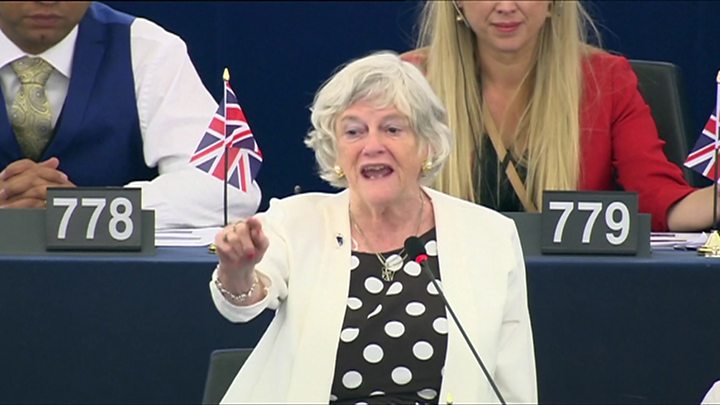Ann Widdecombe attacks EU leader election 'betrayal'

Ann Widdecombe has attacked the EU for the way it appoints its leaders, calling it a "serious betrayal".
Earlier this week, member state leaders nominated candidates for the top jobs, such as the presidents of the European Council and the European Commission.
In her first speech to the European Parliament, the Brexit Party MEP called the process "not democratic at all".
But European Council President Donald Tusk argued the selections had a "strong democratic legitimacy".
The five nominations for the EU leadership roles were announced on Tuesday, after days of talks between leaders of the member states.
German Defence Minister Ursula von der Leyen was nominated to replace the current European Commission President Jean-Claude Juncker - becoming the first woman to take the role.
Belgian liberal Prime Minister Charles Michel was nominated to replace Mr Tusk.
Most of the roles must now be ratified by the European Parliament.
But critics of the selection process have complained that the European Parliament's own contest for the main job - the "Spitzenkandidaten" (lead candidate) process - was ignored, and that four of the main jobs went to western Europeans, with no nominations from eastern Europe.
Ms Widdecombe, who represents the South West of England in the European Parliament, said if she had needed convincing that "the best thing for Britain is to leave here as soon as possible", the process of choosing the leadership of the EU had achieved it.
"If that is this place's idea of democracy, then that is a serious betrayal of every country that is represented here, because it is not democratic at all," the former Conservative MP said.
"And that is just one of many reasons why Britain is right to be leaving this place, hopefully on Halloween."
Ms Widdecombe compared Brexit to "slaves" rising up against their owners, saying there was "a pattern consistent throughout history of oppressed people turning on the oppressors".
She added: "It doesn't matter which language you use. We are going and we are glad to be going. Nous allons. Wir gehen, We're off!"
But Mr Tusk told the European Parliament that he had sought consensus before making the nominations.
"It took us three days [to decide], because I wanted to be sure that every member state, big or small, from every corner of Europe, was on board when it came to the future leadership of the union," he said.